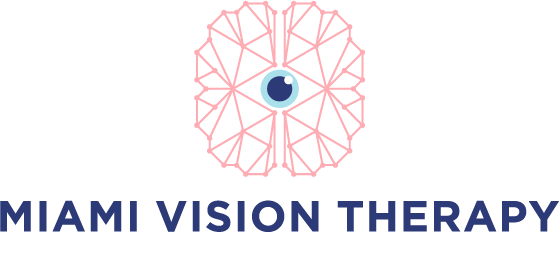Did you know that visual problems can dramatically reduce a person’s ability to learn or their productivity at work?
Poor visual skills can negatively impact performance in school, at the office, and on the sports field. Understanding and knowing what to look out for can help with early detection and treatment of visual problems.
Below are various visual efficiency problems and symptoms that are commonly diagnosed by eye doctors.
1. Eye Teaming Problems
Your two eyes need to work in perfect coordination and unison, in order to see the world in a clear and precise way. The images the brain creates may be confusing or uncomfortable when the eyes don’t function as a team.
Convergence excess and convergence insufficiency are two common eye teaming problems.
Convergence insufficiency refers to when the eyes have difficulty focusing inwards on an object that is being held closer to the nose. Convergence excess is the opposite, the eyes aren’t able to easily focus outward. This leads to difficulties with distance vision.
Symptoms of eye teaming problems include:
- Double or blurred vision
- Difficulty concentrating
- Difficulty reading
- Eye rubbing or squinting
- Headaches
- Poor depth perception
- Tired or uncomfortable eyes
2. Eye Tracking Problems
Eye tracking involves effortless and smooth movements of the eyes. Proper eye tracking helps quickly gain information from and scan the environment around us to understand where we are and what our next move should be.
When eye movements are slower than normal, it may indicate an eye tracking problem. Three types of eye tracking problems are: deficiency or pursuits, deficiency of saccades, and fixation dysfunction.
Individuals with an eye tracking problem may:
- Have poor hand-eye coordination
- Easily lose their place while reading
- Often skip lines when reading
- Spelling difficulties
- Substitute or omit words
3. Focusing Problems
Every time our eyes shift their gaze from one object to another, they accommodate their focusing power so that each object appears clear. When the muscles responsible for accommodating focus in the eye can’t relax, tighten or maintain position, focusing problems arise.
Symptoms of focusing problems can include:
- Avoiding or difficulty reading
- Blurred vision
- Blurred vision when shifting focus from one object to another
- Headaches during or after reading
- Holding objects close to the face in order to view them
- Frequent eye rubbing
- Watery eyes
Vision Therapy Can Help
Vision therapy helps to strengthen and increase eye-brain connection, which is often weak in a person with visual efficiency problems.
A personalized vision therapy program involves custom-made visual exercises that create new pathways in the visual system. By regularly performing these exercises patient’s will develop improved visual skills and may notice a significant reduction in symptoms. Vision therapy may also involve the use of specialized lenses, filters, or prisms.
